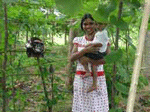Sri Lanka: “All our eggs in one basket”
Published on Mon, 2012-02-27 07:55
Ensuring guaranteed and diverse seed supplies and crop production has been an important part of the work of the Movement for National Land and Agricultural Reform in Sri Lanka (MONLAR), focal point of Social Watch in Sri Lanka. Here is the story of one family who, with its support, has been able improve both its diet and its income through bio-diverse agricultural practices. Subhramanyam and his wife Marudai farm a 500 square metre home garden in Maeskiliya, Sri Lanka, reported by Simon Chambers through the web site of The Primate's World Relief and Development Fund, an Anglican Church of Canada’s agency devoted to promote the values of sustainable development. They used to grow vegetables and fruits in the garden using chemical fertilizer and pesticides and were not careful about maintaining variety in their crop selection. They didn’t think about the nutritional needs of the family as their crops were sold rather than being eaten by the family, wrote Chambers on the first of a series of stories entitled “Seven days to tend the Earth lenten reflections”. Growing crops this way cost the family 3000-3500 Rupees each four-month growing season, with crop sales totalling only 5000-5500 Rupees. After receiving training from MONLAR in 2008, Subhramanyam and Marudai now plant 10 to 12 different varieties of vegetables each season and grow a variety of fruits including guava, papaya, banana and jack fruit. They use compost instead of chemical fertilizer. MONLAR taught them to prepare fermented juice from fallen leaves and cow dung and use the concoction as a natural pesticide. The growing costs each season have been reduced to between 500 to 1000 Rupees, which has therefore significantly increased the family’s income. After working with MONLAR for a year Subhramanyam and Marudai now favour indigenous crops which grow well, conserve biodiversity and need less support. Each season, they preserve some of their own seeds from the indigenous varieties they plant. Subhramanyam and Marudai’s family is healthier since they began eating the organic produce of their home garden. Each day the family eats at least four different vegetables. Since they stopped using chemical fertilizer, they have also been able to gather more types of leafy vegetables that are growing naturally in their garden and are very nutritious. Source |


